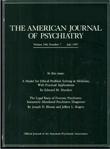Positive and Negative Symptom Response to Clozapine in Schizophrenic Patients With and Without the Deficit Syndrome
Abstract
OBJECTIVE: In a preliminary report, the authors observed that clozapine was superior to haloperidol in the treatment of positive and negative symptoms in stable outpatients with schizophrenia. In this final report, they examine the effects of clozapine on positive and negative symptoms in patients with and without the deficit syndrome to determine which patients receive the positive symptom advantage of clozapine and the extent of clozapine's therapeutic effects on negative symptoms. In addition, they examine the long-term effects of clozapine on positive, negative, and affective symptoms, social and occupational functioning, and quality of life. METHOD: Seventy-five outpatients with schizophrenia, who met retrospective and prospective criteria for residual positive or negative symptoms, were entered into a 10-week double-blind, parallel-groups comparison of clozapine and haloperidol. Patients who completed the double-blind study were then entered into a 1-year open-label clozapine study. RESULTS: For patients who completed the 10-week double-blind study, clozapine was superior to haloperidol in treating positive symptoms. This effect was not observed in the intent-to-treat analyses. There was no evidence of any superior efficacy or long-term effect of clozapine on primary or secondary negative symptoms. Long-term clozapine treatment was associated with significant improvements in social and occupational functioning but not in overall quality of life. CONCLUSIONS: For schizophrenic patients who are able to tolerate clozapine therapy, clozapine has superior efficacy for positive symptoms but not negative symptoms and is associated with long-term improvements in social and occupational functioning for patients with and without the deficit syndrome



